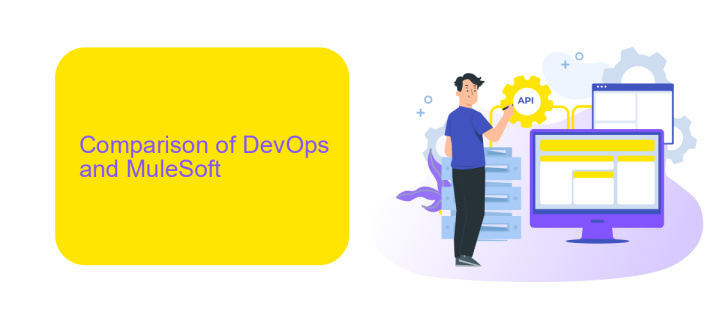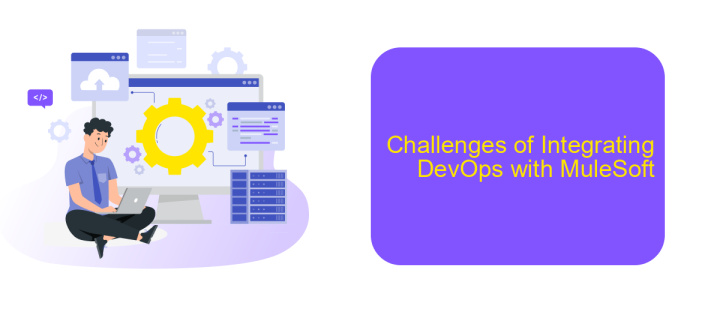DevOps Vs MuleSoft
In today's fast-evolving technological landscape, organizations are increasingly leveraging DevOps and MuleSoft to enhance their software development and integration processes. While DevOps focuses on fostering collaboration between development and operations teams to accelerate delivery, MuleSoft provides a robust platform for seamless API-led connectivity. This article delves into the core differences and synergies between DevOps and MuleSoft, helping you understand their unique contributions to modern IT environments.
Introduction: What is DevOps and MuleSoft?
DevOps and MuleSoft are two pivotal components in modern software development and integration. DevOps emphasizes collaboration between development and operations teams to improve the speed and quality of software delivery. MuleSoft, on the other hand, focuses on enabling seamless integration of various applications, data, and devices through its Anypoint Platform.
- DevOps: A culture and set of practices aimed at unifying software development (Dev) and software operation (Ops).
- MuleSoft: A platform for building application networks that connect apps, data, and devices with APIs.
Combining the strengths of DevOps and MuleSoft can greatly enhance an organization's ability to deliver integrated, high-quality software solutions rapidly. For instance, tools like ApiX-Drive can streamline the integration process, making it easier to connect various services and automate workflows. This synergy allows businesses to respond more quickly to market demands and maintain a competitive edge.
Comparison of DevOps and MuleSoft

DevOps and MuleSoft serve different yet complementary roles in the software development and integration landscape. DevOps focuses on automating and streamlining the software development lifecycle, promoting practices like continuous integration and continuous deployment (CI/CD). This approach enhances collaboration between development and operations teams, ensuring faster delivery and higher quality of software products. On the other hand, MuleSoft specializes in API-led connectivity, enabling organizations to integrate various applications, data, and devices seamlessly. By leveraging MuleSoft, businesses can build an application network that connects different systems and services, fostering agility and innovation.
While DevOps emphasizes the efficiency of development processes, MuleSoft addresses the complexity of integration. For example, tools like ApiX-Drive can be used alongside MuleSoft to automate the integration of various platforms, further simplifying the process. DevOps practices can be applied to manage and monitor these integrations, ensuring they are reliable and scalable. Thus, combining DevOps and MuleSoft can lead to a more cohesive and efficient IT ecosystem, where development speed and integration complexity are both effectively managed.
Benefits of Using DevOps with MuleSoft

Integrating DevOps with MuleSoft can significantly enhance the efficiency and reliability of your development and integration processes. By combining the robust capabilities of MuleSoft's API-led connectivity with the agile and collaborative nature of DevOps, organizations can achieve faster deployment cycles, improved quality, and better alignment between development and operations teams.
- Accelerated Development: DevOps practices streamline the development lifecycle, allowing for continuous integration and continuous delivery (CI/CD) of MuleSoft applications.
- Enhanced Collaboration: By fostering a culture of collaboration between developers and operations, DevOps ensures smoother and more efficient integration processes.
- Improved Quality: Automated testing and monitoring within DevOps pipelines help identify and resolve issues early, leading to more reliable MuleSoft integrations.
- Scalability: Leveraging tools like ApiX-Drive for integration automation can further enhance the scalability and flexibility of your MuleSoft solutions.
- Cost Efficiency: Streamlined processes and automated workflows reduce manual efforts and associated costs, optimizing resource utilization.
Incorporating DevOps practices with MuleSoft not only streamlines the integration process but also ensures that your API-driven initiatives are robust, scalable, and aligned with business goals. Tools like ApiX-Drive can further augment these benefits by providing seamless integration automation, making it easier to manage and scale your integration solutions effectively.
Challenges of Integrating DevOps with MuleSoft

Integrating DevOps with MuleSoft presents several challenges that organizations must navigate to achieve seamless operations. One of the primary challenges is the cultural shift required to align the DevOps philosophy with MuleSoft's integration capabilities. DevOps emphasizes continuous integration and continuous deployment (CI/CD), which can be difficult to implement in environments where MuleSoft's API-led connectivity model is prevalent.
Another significant challenge is the complexity of managing and orchestrating multiple APIs and microservices. MuleSoft's platform is designed to facilitate API management, but integrating this with DevOps tools and practices requires careful planning and execution. Ensuring that APIs are consistently deployed, monitored, and updated in a DevOps pipeline can be resource-intensive and prone to errors.
- Ensuring compatibility between DevOps tools and MuleSoft platform
- Managing API versioning and lifecycle within a CI/CD pipeline
- Maintaining security and compliance across integrated systems
- Automating testing and deployment processes for MuleSoft APIs
To mitigate these challenges, organizations can leverage services like ApiX-Drive, which offer automated integration solutions. ApiX-Drive helps in streamlining the integration process by providing pre-built connectors and workflows, thereby reducing the manual effort involved. This can significantly enhance the efficiency and reliability of integrating DevOps practices with MuleSoft's API management capabilities.
Best Practices for a Successful DevOps and MuleSoft Implementation
Successful DevOps and MuleSoft implementation requires a strategic approach that emphasizes collaboration and automation. Begin by fostering a culture of communication between development and operations teams. This can be achieved by adopting Agile methodologies and regular cross-functional meetings. Additionally, leveraging continuous integration and continuous deployment (CI/CD) pipelines ensures that code changes are automatically tested and deployed, reducing the risk of errors and accelerating the release cycle.
Another critical aspect is the integration of tools and services that streamline workflows. For instance, using a service like ApiX-Drive can significantly simplify the process of connecting various applications and automating data flows. This not only enhances operational efficiency but also ensures that data is consistently synchronized across systems. Monitoring and logging are equally important; implement robust monitoring tools to track performance and quickly identify issues. By adhering to these best practices, organizations can achieve a seamless and efficient DevOps and MuleSoft integration.


FAQ
What is the main difference between DevOps and MuleSoft?
Can DevOps and MuleSoft be used together?
Is MuleSoft suitable for small to medium-sized businesses?
What are some alternatives to MuleSoft for integration?
How does DevOps improve the integration process?
Do you want to achieve your goals in business, career and life faster and better? Do it with ApiX-Drive – a tool that will remove a significant part of the routine from workflows and free up additional time to achieve your goals. Test the capabilities of Apix-Drive for free – see for yourself the effectiveness of the tool.

